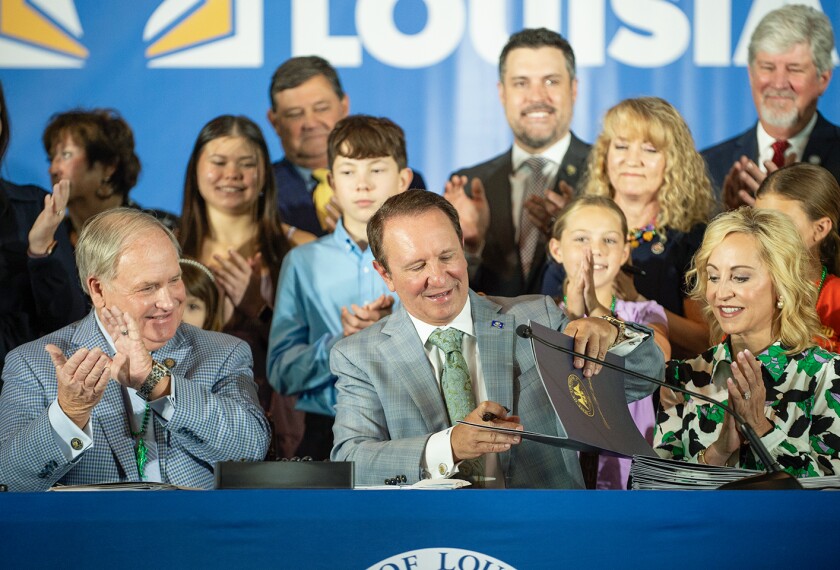The political prospects appear dreary for President Donald Trump’s proposed $59 billion budget for the U.S. Department of Education—but that hasn’t stopped it from riling people up.
In two budget hearings before the House and Senate during the past three weeks, U.S. Secretary of Education Betsy DeVos has defended the Trump administration’s proposal to cut roughly 9.2 percent, or $13.5 billion, from the department’s budget and dramatically expand school choice. She’s gotten a chilly reception from Democrats, as well as some Republicans, who appear hostile to many of the large cuts, among other things, in the proposed fiscal 2018 spending plan.
“This is a difficult budget request to defend,” Sen. Roy Blunt of Missouri, the top Republican on the Senate subcommittee that funds the Education Department, told DeVos earlier this month in a hearing.
Fending Off Lawmakers
DeVos also tried to fend off questions from lawmakers about how the proposed choice plans will work, including their handling of thorny civil rights issues.
The budget blueprint includes a $250 million research program that would fund private school choice, $1 billion in new federal Title I money to follow disadvantaged students to the public schools of their choice, and a 50 percent bump to federal charter school grants, up to $500 million.
On the other side of the ledger, the proposal would eliminate $2 billion for teacher training and class-size reductions under Title II, as well as $1.1 billion in spending on after-school and other enrichment programs. Traditional Title I aid to districts, career and technical education funding, and special education money would also receive relatively small cuts. In all, more than 20 programs would be eliminated or phased out.
Blunt said the major cuts to formula-funded programs would be all but impossible to pass.
DeVos defended the budget’s approach, telling senators in the appropriations hearing that while choice was crucial for expanding education opportunities, other recent big-spending approaches in Washington had failed. “The notion that spending more money is going to bring about better results is, I think, ill-advised,” DeVos said.
Even though presidents’ budget requests are often greeted with skepticism on Capitol Hill, the negative reaction to this proposal is unusually pronounced, said Vic Klatt, a former GOP congressional staffer who is now a principal at the Penn Hill lobbying firm in Washington.
“It made a lot of people uncomfortable, and sometimes with no good reason. And I think part of the reason is that they did less consulting on some of the specifics,” Klatt said. “It probably would have helped if they had talked to the Hill a little bit more.”
Some of the most pointed exchanges between Democrats and DeVos came over the budget’s push to expand school choice.
In a House subcommittee budget hearing last month, Rep. Katherine Clark, D-Mass., repeatedly asked whether the $250 million would allow schools that might wish to discriminate against LGBT or black students to participate. (Federal law contains protections against racial discrimination, but is less clear on issues of sexual orientation.) DeVos didnot directly answer the question.
“The bottom line is we believe that parents are the best equipped to make choices for their students’ schooling and education,” DeVos told Clark. “States and local communities are best equipped to make these decisions and frameworks on behalf of their students.”
While DeVos also said her department would investigate alleged civil rights violations, Clark said she was “shocked” by the response.
‘Follow Federal Law’
Under similar questioning in the Senate subcommittee, DeVos repeatedly said that, “Schools that receive federal funds must follow federal law, period.” But Democrats argued that this stance leaves the door open for schools participating in the proposed program to discriminate, including on religious grounds.
Under questioning from Sen. Patty Murray, D-Wash., DeVos also said that any schools taking part in the $250 million proposal would “absolutely” have to abide by federal special education law. However, the Individuals with Disabilities Education Act currently does not apply to private schools. Congress would either have to reauthorize the IDEA or amend it through the budgeting process in order to change that. Both propositions could face very long odds.
Republicans also had their issues with the various budget proposals.
Sen. Richard Shelby, R-Ala., raised concerns about the proposed school choice expansion by asking how the programs would serve students in rural areas. DeVos responded that online education options could be helpful in those instances. DeVos also defended a proposed $168 million cut, or 15 percent, for career and technical education grants, arguing that there are overlapping efforts for CTE elsewhere in the federal budget.
And Sen. James Lankford, R-Okla., asked DeVos whether the $1 billion program under the Title I umbrella would be similar to the Obama administration’s Race to the Top program, which offered grants to states to take certain policy approaches, which many Republicans came to view as inappropriately coercive. DeVos assured Lankford that the Title I choice proposal wouldn’t be mandatory. The same was true of Race to the Top.






